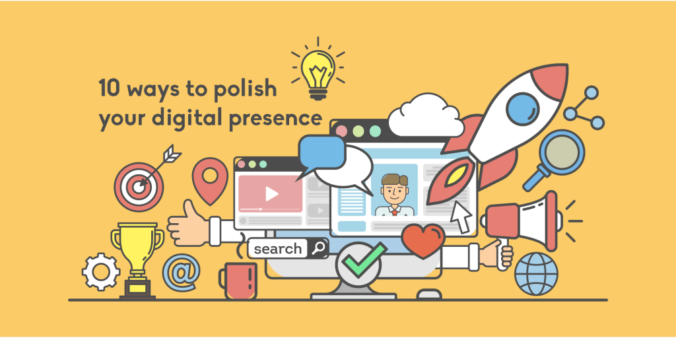Mastering Cash Flow This Festive Season


More and more of our lives are spent online and when it comes to business, it’s no different. Google is where more Australians are searching for services than ever before, with a market share of over 90%. This means that having a prominent and cultivated digital presence is vital for business success. Your digital footprint is wide-reaching and it can be difficult to know what to cover, so here are 10 ways you can make sure yours is up to standard:
Get the basics right and optimise your website for Google. First step – head to ‘Google My Business™’ and fill in your profile. Include appealing images, legitimate reviews and compelling descriptions. This complements your business and allows it to appear on Google Search, Google Maps™ and Google +. Online search has increased by 20% across all industries, year in, year out, so if you aren’t on Google™ you are missing out on a large market.
People say that the second page of Google is the best place to hide a dead body – think about it, when was the last time you clicked through to page 2? Therefore, you need to have as much control over your first page on Google as possible. Try and ensure that your business appears on the first page, and that there are no negative reviews or ratings showing up. If there are, it’s time to do some damage control. Contact some of your regular customers or recent visitors who have had a positive experience and ask them for an online review or feedback.
Last year, mobile overtook desktop in the U.S as the preferred searching device for businesses, and Australia is well on the way to emulating this trend. But is your business ready? According to the latest figures from growth agency roi.com.au , 66% of the nation’s websites aren’t optimised for mobile devices. Make sure your mobile site doesn’t use uncommon software like Flash; that the content is responsive to the smaller screen; the text can be read without zooming and the links are not squashed together. Last year, Google announced that it will prioritise companies with mobile-friendly websites when people are searching on tablets, so make sure that yours is up to scratch.
Your social media channels are an important component of your digital presence, and should always be used for sharing, not selling. Their purpose is to provide your followers with photos and non-product related stories. For instance, if your business helps a charity or is involved in the local community, make sure you share it on your social media platforms, but give ads or spruiking a miss.
Google AdWords are used on pages where someone is actively looking for what you do or sell. For instance, if your company specialises in blue handbags and somebody types this into Google, your ad will appear at the top of the search page.
On the other hand, Facebook ads are targeting a demographic that you’ve identified as your potential customers through age, gender, location etc. Your ad will be shown to anyone who fits this criteria when they are logged into Facebook. While the reach for Facebook is higher, the ads are not as targeted. Either of these options are a good way to attract paid traffic, so trial both to find out which works best for you.
Grab your business name on Google AdWords before your competitor does. Bid for your business name as a keyword so that it appears at the top of Google when people look for your type of business. Google Adwords charge every time someone clicks on your ad. As you’ll have the most relevant website for that search term, your Quality Score will be higher, lowering the cost per click you’ll need to pay.
Try to partner with a business that has a greater online reach than your’s currently, to build your online presence. This can take many different forms; for instance, if you’re an accountant you may choose to join with a legal firm for referrals. Alternatively, if you are running a restaurant, you may decide to partner up with one of the main delivery sites such as Menulog or Deliveroo which will effectively market your business for you.
Landing pages are completely separate from the pages on your website. They need to be more direct, in both the language and call to action. Ideally, each of your products and services should have their own landing page. Landing pages are ultimately for selling, so think of them as a billboard for your products. You need to grab attention quickly, with a snappy headline and a unique selling proposition, with the benefits displayed prominently. As with a billboard, good imagery is vital, so pick a picture that pops.
Competing with massive brand names is always challenging, especially as a smaller business, and for this reason, it’s important to win the local war. Luckily, there will always be a percentage of people who want to walk into a store instead of shopping online. To win them over, get the basics right and make sure your business comes up first when people are searching for a specific product/service in the area. Always place emphasis on your expert advice and superior service to show why you are better than the big guys.
Share your expert industry knowledge across as many channels as you can. You could write a blog on your website, record a podcast, submit an article to an industry magazine or speak at a trade show or association event. Another good (although slightly more labour intensive option) is to monitor forums for questions in your area of expertise and provide answers. Whether you’re a plastic surgeon providing advice on post-op care or a dry cleaner explaining how to get red wine out of white jeans, you can become an established online presence in that particular field. If you notice a reoccurring question, write a blog post about it and work towards ranking first and stealing that traffic.
Google My Business, Google Maps, Google AdWords, and Google are trademarks of Google LLC.
You may also like
Australian-based 24/7 support